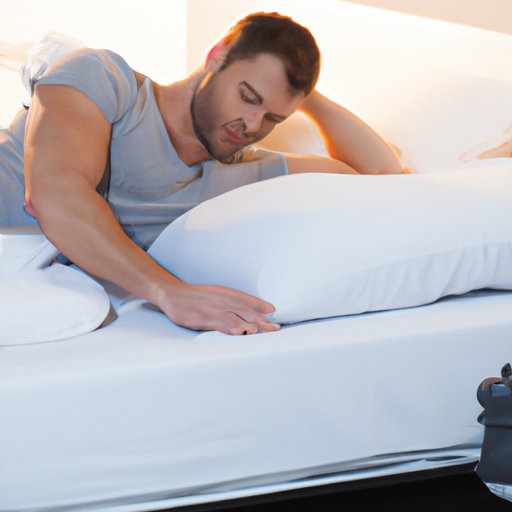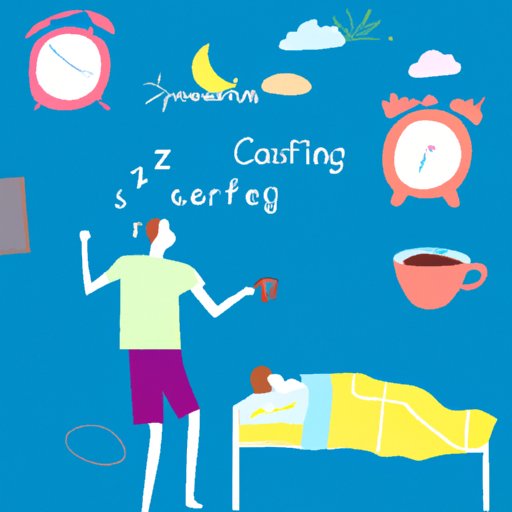Introduction
Waking up earlier can be an intimidating task. It requires a significant amount of discipline and motivation, as well as an understanding of what it takes to get enough restful sleep. This article will explore how to start waking up earlier by discussing strategies for setting a consistent bedtime and wake up time, making sure your bedroom is conducive to sleeping, avoiding caffeine or sugary drinks in the evening, exercising regularly, establishing an enjoyable morning routine, using light to your advantage, and listening to relaxing music before bed.
Set a Consistent Bedtime and Wake Up Time
One of the most important steps in learning how to start waking up earlier is to set a consistent bedtime and wake up time. Having a regular sleep schedule helps to ensure that you are getting enough restful sleep, which is essential for feeling energized and focused during the day. It also helps to regulate your body’s internal clock, which makes it easier to wake up in the morning.
When setting your bedtime and wake up time, consider your daily schedule and any other commitments that you have. If you have a busy day ahead of you, it may be beneficial to go to bed earlier so that you can get enough rest. On the other hand, if you find yourself with some extra time in the morning, you may want to set your alarm a little bit earlier so that you can take advantage of those few extra hours.
In order to ensure that you stick to your new sleep schedule, it is important to establish a nightly routine. This could include anything from reading a book or taking a warm bath to meditating or journaling. The key is to find something that works for you and makes you feel relaxed and ready for sleep. Doing this consistently will help to keep your body on track and make it easier to wake up in the morning.

Make Sure Your Bedroom Is Conducive to Sleeping
Another important step in learning how to start waking up earlier is to make sure your bedroom is conducive to sleeping. This means adjusting the environment in your bedroom to ensure that it is comfortable and relaxing. This could include things like keeping the room dark, using blackout curtains or shades, or adding soundproofing materials to block out outside noise.
It is also important to make sure that your bed is comfortable and supportive. Investing in a quality mattress and pillow can make a world of difference when it comes to getting a good night’s sleep. Additionally, make sure that your bedding is breathable and temperature-appropriate. If you tend to get hot while sleeping, opt for a lighter weight comforter or sheet set.
Finally, try to limit the amount of technology in your bedroom. The blue light emitted from screens can disrupt your sleep cycle, so it is best to avoid having any electronic devices in the bedroom. If you need an alarm clock, opt for one with a dim setting or one that gradually increases in brightness.

Avoid Caffeine or Sugary Drinks in the Evening
Caffeine and sugar can both have a negative effect on your sleep cycle, so it is best to avoid consuming either too close to bedtime. Caffeine is a stimulant that can stay in your system for up to 8 hours, so it is best to steer clear of coffee, tea, or energy drinks after 2 pm. Sugary drinks can also cause a spike in your blood sugar levels, which can lead to difficulty falling asleep.
If you are craving something sweet or caffeinated in the evening, try opting for a healthier alternative. Herbal teas, decaf coffee, or sparkling water with a splash of juice can all satisfy your cravings without disrupting your sleep. You can also try snacking on fruits or nuts, which are packed with nutrients and can help to promote restful sleep.
Exercise Regularly, but Not Too Close to Bedtime
Exercise can be extremely beneficial for getting a good night’s sleep. Regular physical activity can help to reduce stress and increase endorphins, both of which can help you to fall asleep faster. However, it is important to note that exercising too close to bedtime can have the opposite effect. It can cause your body to become aroused and energized, which can make it more difficult to drift off to sleep.
To maximize the benefits of exercise, aim to complete your workout at least 3 hours before bedtime. This will give your body enough time to cool down and relax, allowing you to fall asleep more easily. Additionally, try to avoid intense workouts late at night, as this can leave your body too stimulated to sleep. Instead, opt for gentler activities such as yoga or stretching.
Establish an Enjoyable Morning Routine
Having an enjoyable morning routine can be a great way to motivate yourself to wake up earlier. Think about activities that you enjoy doing in the morning, such as going for a walk or doing some yoga. Having something to look forward to can make it easier to get out of bed in the morning, as well as provide you with a sense of accomplishment and satisfaction.
You can also use your morning routine as a time to reflect or practice mindfulness. Taking a few moments to center yourself and focus on your breathing can help to reduce stress and anxiety, and put you in the right frame of mind to start your day. Additionally, you can use this time to set intentions for the day ahead, or even just to appreciate the beauty of the sunrise.
Use Light to Your Advantage
Light is one of the most powerful tools for regulating our sleep cycle. Exposure to natural sunlight during the day helps to keep our circadian rhythm in check, while avoiding bright lights in the evening helps to signal to our bodies that it is time to sleep. To get the most out of this tool, try to get outside in the morning for at least 15 minutes and open your curtains or blinds to let in natural light.
Additionally, you can use artificial light to your advantage. Investing in a sunrise alarm clock can be a great way to ease into your day. These clocks mimic the gradual rise of the sun, providing a gentle wake up call that is much easier on the eyes than a traditional alarm. You can also try using a dawn simulator, which gradually increases the brightness of your bedroom lights to help you wake up naturally.

Listen to Relaxing Music Before Bed
Listening to calming music before bed can be a great way to wind down and prepare for sleep. Listening to music can help to reduce stress and anxiety, as well as provide a distraction from any worries or thoughts that may be keeping you up. When choosing music for bedtime, opt for slower songs with calming melodies and peaceful lyrics.
If you prefer not to listen to music, you can also try listening to nature sounds such as rain or ocean waves. These sounds can be very relaxing and can help to lull you into a deep sleep. Additionally, you can experiment with guided meditations or relaxation exercises, which can help to calm your mind and body.
Conclusion
Starting to wake up earlier can seem like a daunting task, but with the right strategies it can be a rewarding experience. By setting a consistent bedtime and wake up time, making sure your bedroom is conducive to sleeping, avoiding caffeine or sugary drinks in the evening, exercising regularly, establishing an enjoyable morning routine, using light to your advantage, and listening to relaxing music before bed, you can successfully train your body to wake up earlier and reap the benefits of an earlier start to your day.
(Note: Is this article not meeting your expectations? Do you have knowledge or insights to share? Unlock new opportunities and expand your reach by joining our authors team. Click Registration to join us and share your expertise with our readers.)
